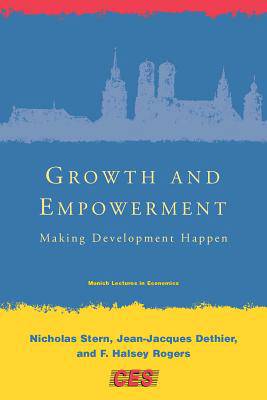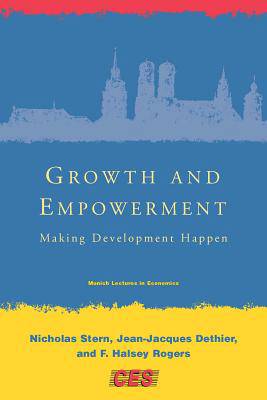
- Retrait gratuit dans votre magasin Club
- 7.000.000 titres dans notre catalogue
- Payer en toute sécurité
- Toujours un magasin près de chez vous
- Retrait gratuit dans votre magasin Club
- 7.000.0000 titres dans notre catalogue
- Payer en toute sécurité
- Toujours un magasin près de chez vous
Growth and Empowerment
Making Development Happen
Nicholas Stern, F Halsey Rogers, Jean-Jacques DethierDescription
Despite significant gains in promoting economic growth and living conditions (or human progress) globally over the last twenty-five years, much of the developing world remains plagued by poverty and its attendant problems, including high rates of child mortality, illiteracy, environmental degradation, and war. In Growth and Empowerment, Nicholas Stern, Jean-Jacques Dethier, and F. Halsey Rogers propose a new strategy for development. Drawing on many years of work in development economics--in academia, in the field, and at international institutions such as the World Bank--the authors base their strategy on two interrelated approaches: building a climate that encourages investment and growth and at the same time empowering poor people to participate in that growth. This plan differs from other models for development, including the dogmatic approach of market fundamentalism popular in the 1980s and 1990s. Stern, Dethier, and Rogers see economic development as a dynamic process of continuous change in which entrepreneurship, innovation, flexibility, and mobility are crucial components and the idea of empowerment, as both a goal and a driver of development, is central. The book points to the unique opportunity today--after 50 years of successes and failures, and with a growing body of analytical work to draw on--to pursue new development strategies in both research and action.
Spécifications
Parties prenantes
- Auteur(s) :
- Editeur:
Contenu
- Nombre de pages :
- 488
- Langue:
- Anglais
- Collection :
Caractéristiques
- EAN:
- 9780262195171
- Date de parution :
- 04-03-05
- Format:
- Livre relié
- Format numérique:
- Genaaid
- Dimensions :
- 161 mm x 235 mm
- Poids :
- 789 g

Les avis
Nous publions uniquement les avis qui respectent les conditions requises. Consultez nos conditions pour les avis.






